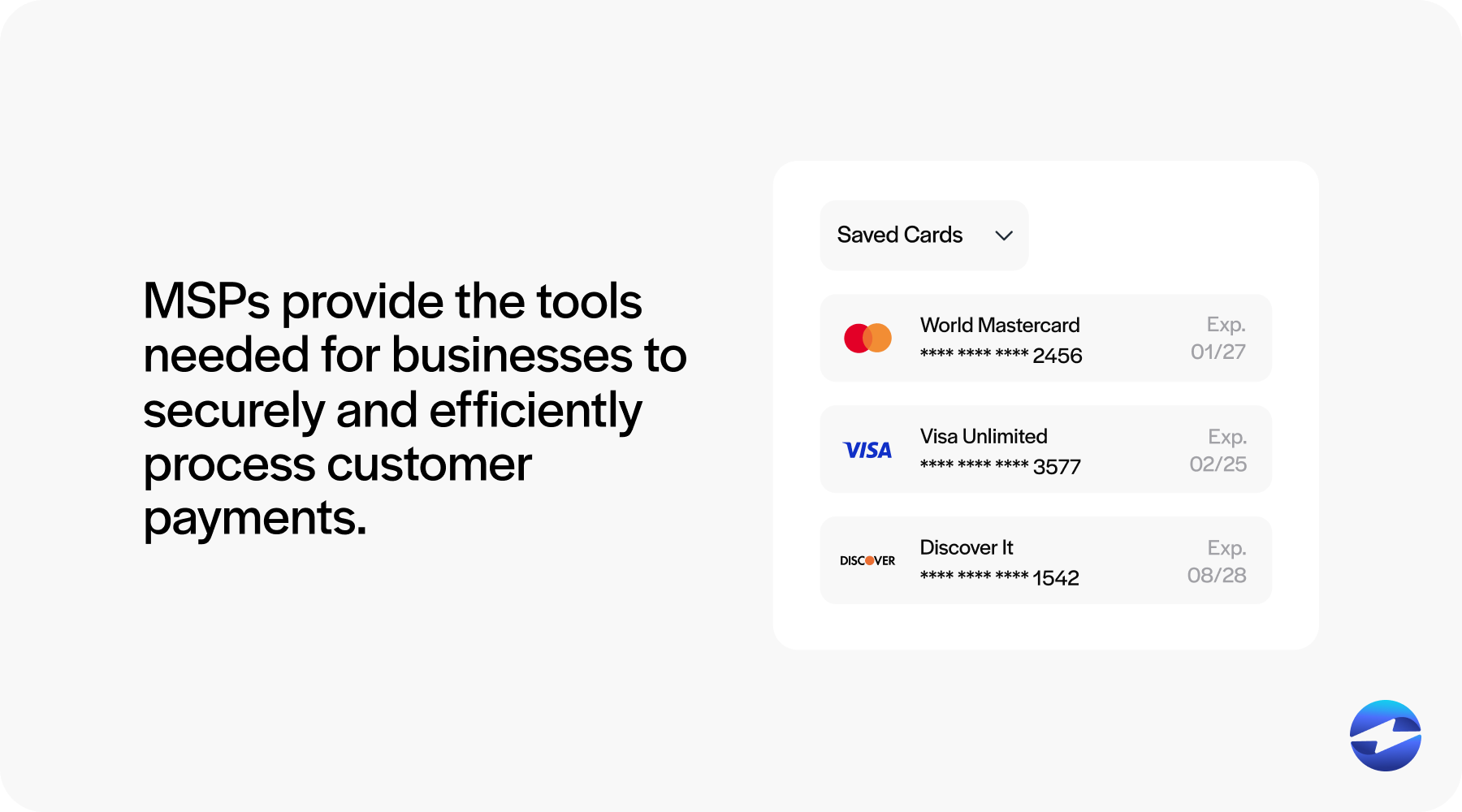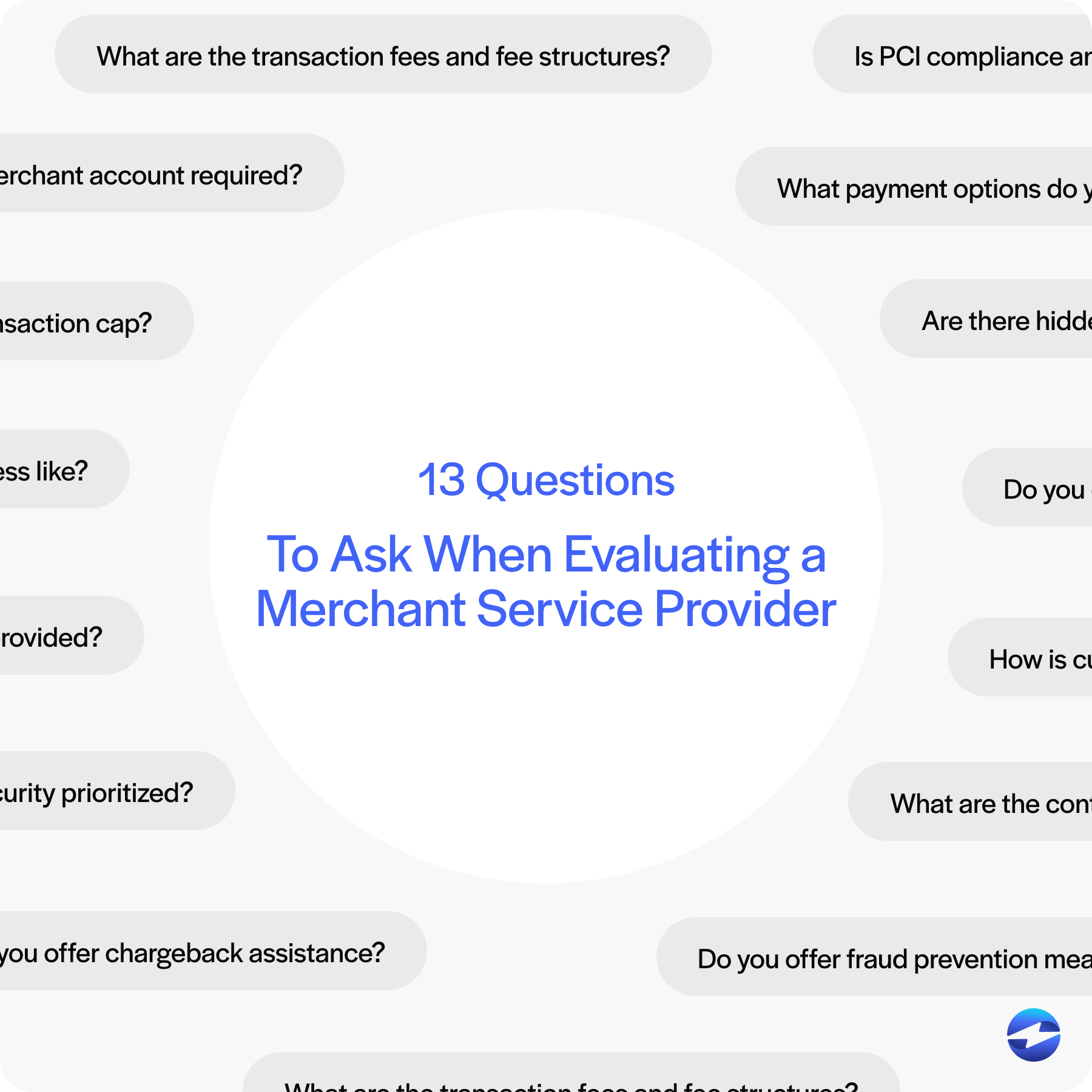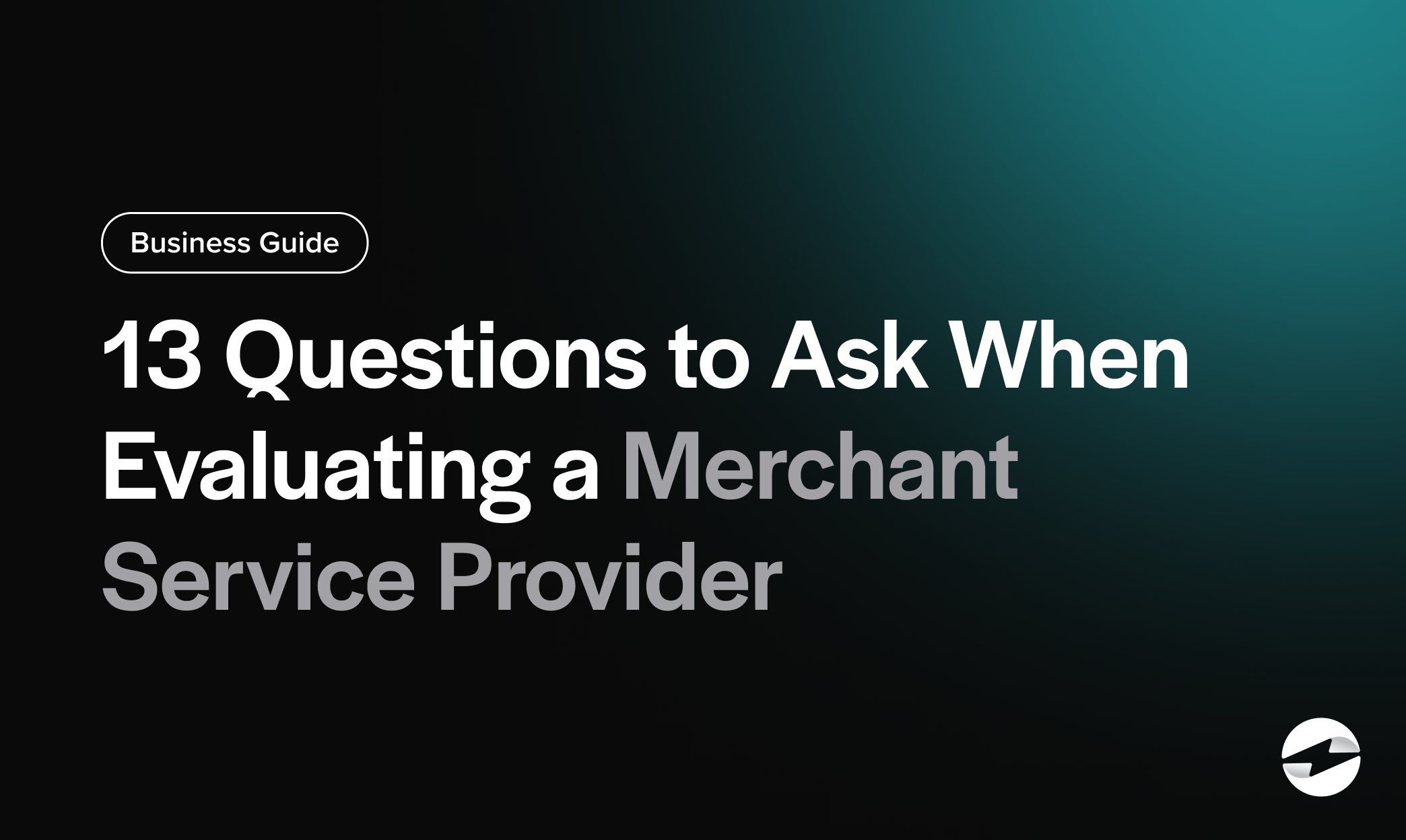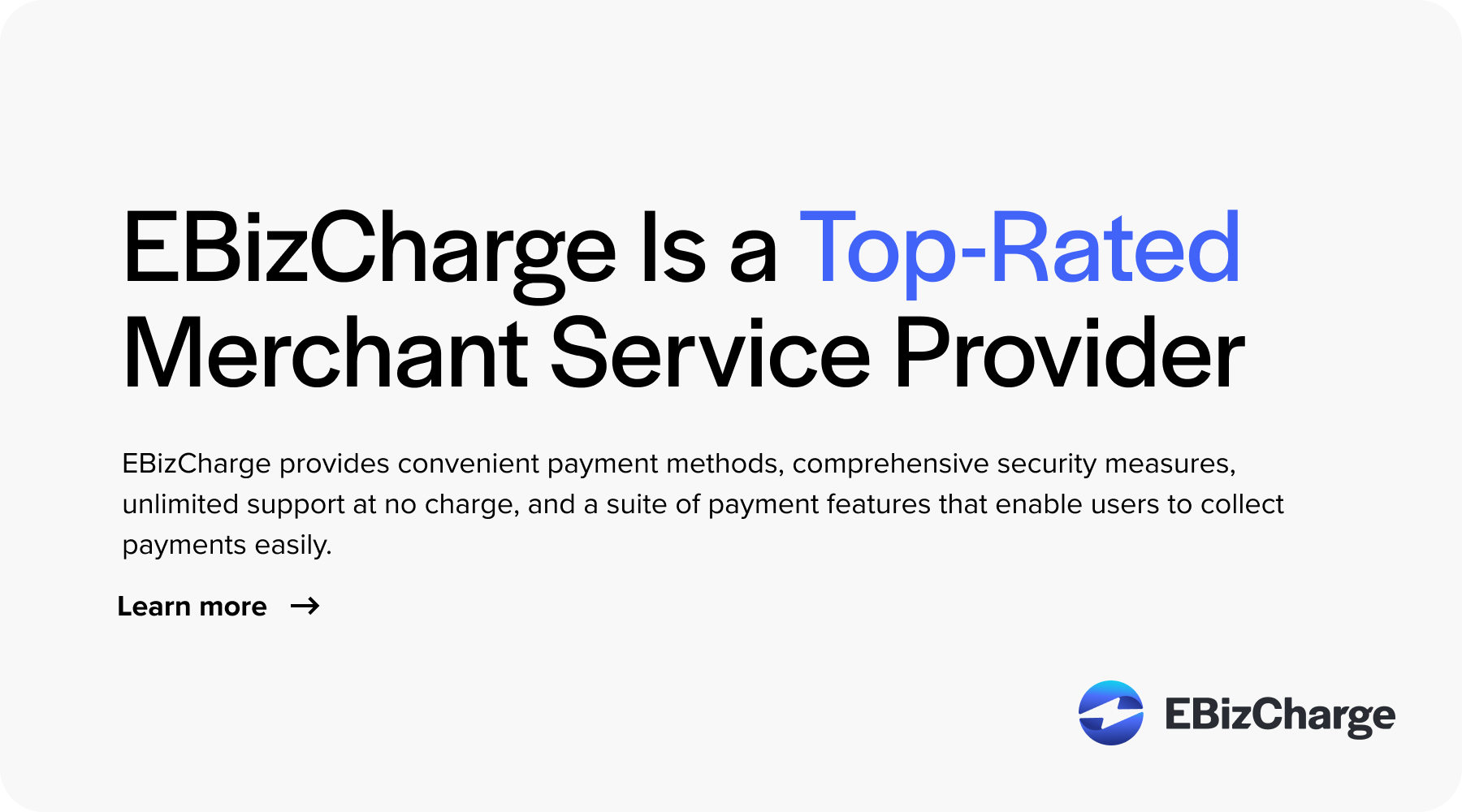Blog > 13 Questions to Ask When Evaluating a Merchant Service Provider
13 Questions to Ask When Evaluating a Merchant Service Provider
Choosing the right merchant service provider is crucial since these providers facilitate electronic payments that will allow your business to accept credit and debit cards and ACH/eChecks, which can significantly impact sales and customer satisfaction.
With numerous merchant service providers to choose from, the decision can be daunting. So, asking the right questions can make all the difference. It’s important to know what a merchant service provider is before learning which questions to ask to choose the right one for your company.
What is a merchant services provider?
A merchant services provider (MSP) is an intermediary between banks, card networks, and merchants, ensuring smooth and secure transactions between businesses and their customers.
MSPs provide payment technology that enables businesses to process digital payments, such as credit, debit, and ACH/eCheck transactions.

Merchant service providers offer various services to facilitate secure and efficient transactions, including payment gateways, virtual terminals, and payment processing hardware. These providers enable businesses to handle in-person and online payments while supporting credit and debit transactions, electronic/ACH payments, and mobile payment options.
Why are merchant services essential?
Merchant services are crucial since they consist of software and tools that enable merchants to accept and process payments.
Providing a reliable mechanism for processing credit and debit cards and other electronic payments helps companies expand payment options, increase sales, and enhance customer satisfaction.
Merchant services typically consist of additional features like fraud prevention and PCI compliance, which are essential to safeguard your business and customer payment data.
MSPs provide the tools and infrastructure needed for businesses to securely and efficiently process customer payments, from handling credit and debit card transactions to offering point-of-sale systems and payment gateways.

13 questions to ask when evaluating a merchant services provider
Since choosing the right merchant services provider can significantly impact your customer payments and financial infrastructure, asking the right questions is necessary.

Here are 13 questions to guide your decision-making process:
- What are the transaction fees and fee structures? Understanding your MSP’s pricing model is vital, whether flat rate, interchange-plus, or tiered pricing structure. Since most providers vary in costs, it’s important to find one with the most upfront pricing or even customized options to guarantee the lowest rates.
- Are there hidden costs? Inquire about extra charges like chargeback fees, PCI compliance fees, and others. Some providers may add hidden fees, such as monthly maintenance charges, account setup fees, or early termination penalties, which can increase overall costs unexpectedly.
- What payment options do you support? Ensuring your MSP supports credit and debit card transactions, mobile payments, and other online payment methods can assist your business in its growth initiatives and provide flexible payment options for customers.
- Is PCI compliance and security prioritized? Ensure your MSP adheres to PCI compliance standards to protect sensitive cardholder data and inquire about any additional security features they offer to safeguard transactions.
- Do you offer fraud prevention measures? Effective security protocols are essential to protect against fraud. Security protocols, such as encryption, tokenization, TLS protocols, 3D Secure, and more, are critical in enhancing payment security.
- What are the contract terms? Review contract terms carefully to understand your commitment, especially regarding fees, renewal policies, and cancellation options. Flexible, short-term contracts are often preferable, as long-term contracts with restrictive terms can lead to unexpected costs or difficulties if your business needs change.
- How is customer satisfaction handled? Merchants should evaluate user reviews of various MSPs to determine if customers are satisfied with their services and to get a good idea of their reputation, especially regarding their service and dispute resolution.
- Is a merchant account required? A merchant account is necessary to process customer payments since it’s a dedicated account where funds are temporarily held before being transferred to your bank account. Determine if you need a new merchant account or if your payment service provider can integrate with your existing account. Some providers offer aggregated accounts, which may be suitable for smaller businesses, while others require dedicated merchant accounts, which are typically beneficial for larger transaction volumes or businesses needing greater control over funds.
- Is there a transaction cap? Some merchant service providers set a limit on the transaction amount or total monthly volume your business can process. Exceeding this cap may result in additional fees or a hold on funds, which can impact cash flow. Understanding transaction limits is essential, especially for businesses with high volumes of sales or large-ticket items, as you may need a provider with flexible or negotiable caps to support your business growth without interruptions.
- What’s the approval process like? Understanding the expected timeline and approval process requirements of the approval process will help your business avoid delays and be equipped with all the necessary information for a smooth onboarding experience. The approval process for setting up a merchant account or payment processing service can vary, often taking a few days to a few weeks, depending on the provider. Be prepared to provide documentation, such as business licenses, bank statements, and financial records, to verify your business’s legitimacy and assess risk.
- Is payment processing equipment provided? If your business collects in-person payments, you’ll likely require physical terminals. Therefore, you must check with your MSP about the availability and costs of the necessary hardware.
- Do you offer chargeback assistance? Dedicated support for chargeback assistance can protect your revenue, improve customer satisfaction by handling disputes efficiently, and reduce the risk of excessive chargebacks, which can harm your business’s reputation and standing with payment networks. Some merchant service providers offer chargeback management tools, dispute resolution assistance, and even monitoring services to help identify and prevent chargebacks before they occur.
- Is support for virtual terminals and payment gateways available? Support is crucial since virtual terminals enable businesses to process payments manually when a customer isn’t present, and payment gateways enable secure online transactions by encrypting card data. With the proper support, your business can ensure its payment processing operations are running smoothly and provide a more seamless customer payment experience.
These questions will help you choose a provider that effectively matches your needs.
Finding the most suitable merchant service provider for your business
When assessing merchant service providers, asking pertinent questions related to costs, customer service, contracts, security measures, and features and functionality is key.
Selecting the right merchant service provider is vital for businesses to facilitate quicker and more efficient payments. Thankfully, reliable providers like EBizCharge can provide an unmatched experience for merchants and their customers.
EBizCharge is a top-rated merchant service provider that offers reliable, cost-effective, and secure payment solutions. EBizCharge is known for its powerful, fully PCI-compliant payment software and transparent pricing that aims to reduce merchants’ costs.
EBizCharge provides convenient payment methods, comprehensive security measures, unlimited support at no charge, and a suite of payment features that enable users to collect payments easily.
Ultimately, businesses should conduct thorough research to find a trustworthy provider like EBizCharge that aligns with their needs, offers competitive rates and exemplary service, and facilitates seamless payments.

